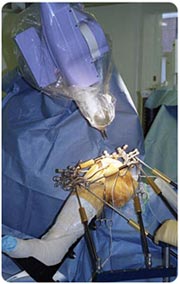 |
A centre for robotic surgery has been created at Imperial College London with the aid of the Helen Hamlyn Trust.
The Hamlyn Centre for Robotic Surgery will champion the integration of robotics into medicine and patient care, with the aim of developing advanced robotic technologies.
It will be based at Imperial College London, in its Academic Health Science Centre (Imperial College Healthcare NHS Trust, St. Mary’s Campus), where experts in a range of disciplines will work to create a national resource in medical robotics, benefiting other UK research groups and industry.
The centre is to be co-directed by Professor Lord Ara Darzi and Professor Guang-Zhong Yang, both senior clinicians with Imperial College Healthcare NHS Trust.
A total of £10m has been donated to the centre from the Helen Hamlyn Trust and Lady Hamlyn personally.
An interdisciplinary team of engineering and clinical scientists will work with the professors on site.
Lady Hamlyn, chair of trustees of the Helen Hamlyn Trust, said: “My personal donation will be contributing to the future development of robotic surgery and other innovations in this very important new field, which will greatly improve patient care in many areas, particularly in cancer care.
“My trust has been closely involved with the development of robotics for some years, and this National Centre will enable Imperial to extend their pioneering work in this unique field.”
Lord Darzi added: “Medical robotics and computer assisted surgery are used in a growing number of operating rooms around the world. This funding will allow the team to leverage our existing research programmes in pursuing adventurous, fundamentally new technologies that will allow more wide-spread use of robotics in medicine and patient care.”
It is envisaged that the robots will be able to transform conventional key-hole surgery, that new ways of empowering robots with human intelligence will be developed, and that miniature “microbots” with have integrated sensing and imaging for cancer surgery and treatment will be created.
Professor Guang-Zhong Yang, commented: “The need to perform delicate surgical procedures safely in tight spaces where the surgeon cannot see directly has created a growing demand for devices that act as extensions of the surgeon’s eyes and hands. This creates a unique opportunity of developing new robotic devices that build on the latest developments in imaging, sensing, mechatronics, and machine vision.
“The potential benefit of medical robotics to patients is exciting and one of the major focuses of the centre is to develop new technologies such as the ‘perceptual docking’ concept for seamless integration of machine precision with human intelligence to allow safe, ubiquitous applications of robotics in healthcare.”
Sir Richard Sykes, rector of Imperial College London, added: “Imperial College has a strong track record in pioneering surgical robotics both technically and clinically. We are very grateful for Lady Hamlyn’s generosity in initiating this major funding campaign that will establish a dedicated centre and UK focus for medical robotics. This will allow us to attract international talents and develop UK technologies that will transform the future development of medical devices.”
Links
